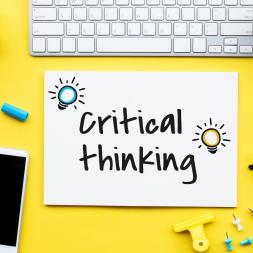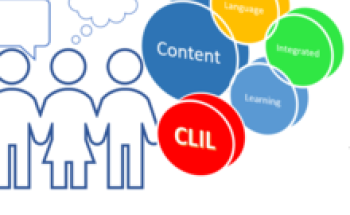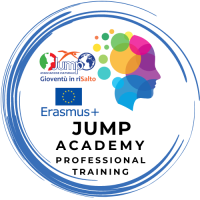
CRITICAL THINKING For Future Generations Of Thinkers
Critical Thinking happens to be a trendy topic and an obvious conclusion to include it in your teaching practice. In fact it is very important for teachers to implement critical thinking in their lessons. For it helps students develop autonomy, self esteem and a better understanding of our world, through a conscientious evaluation of available information.
Description
This course substantially introduces the concept of critical thinking. Also, it helps you grow tools and strategies needed to incorporate it in your lessons. The main goal is to develop the skill on how to teach critical thinking to students through any subject or discipline, and at any level of education. In this course, teachers are introduced to the elements of reasoning, universal intellectual standards, and intellectual traits through readings, discussions, and practical activities. Teachers have the chance to redesign lessons and strategies using the concepts and principles of critical thinking, practice strategies for Socratic discussions, help students to learn how to consciously use critical thinking skills and strategies while learning, and in their lives.
Critical thinking is connected with creativity, problem-solving, and leadership. These skills are fundamental, especially after the long and very stressful period of COVID pandemic.
In order to equip students with the necessary competencies to face the real outside world, adapt their career to future and new job placements. To gain a better understanding of the role they would like to cover in society and better interact with the people they’ll meet (colleagues, competitors, mentors, friends).
Critical thinking is and continues to be, a deeply misunderstood cognitive set of skills. Although all educators can agree on its importance, views remain split on what exactly critical thinking is, or how to effectively teach this skill to students.
The course covers strategies to not only develop students’ critical thinking skills but also blend critical thinking lessons into an instructor’s specific discipline and subject/topic.
Participants explore the complex topic of critical thinking and get a perspective on how a student could conceptualize—and practice—critical thinking in the classroom.
Teaching young people skills such as active listening, self-awareness and empathy can equip them to succeed both academically and socially.
On one end this training helps educators discuss and learn more on emotions, touching most of the psychological literature; On the other end, it fosters the understanding of the need for a common teaching method based on the development of “emotional competencies” skills in learners/students. While Education has perhaps been slow to recognise the importance of such emotional capacities, recent work has sought to address this lacuna. Perhaps the best-known representation of this trend is the work on Multiple Intelligences (Gardner 1983; 1993) and on Emotional Intelligence (Goleman, 1996; Mayer et al. 2000, Bar-On, 2002).
In educating nowadays – in a wider European perspective – we know the EU guidelines on the new “Key competences for the lifelong learning” (Recommendation May 2018) and other guidelines based showing the need to develop other key aspects like:
- Active listening,
- Vocabulary for feelings,
- Developing self-awareness,
- Showing empathy being ‘with’ others,
- Managing emotions and self-regulation.
This training will help educators improve their teaching method, by reflecting and increasing their knowledge on the main topics, widening perspectives and broadening their work to new cooperations with colleagues and international educators.
Learning objectives
Learning how to build critical thinking learning outcomes, assessments, and learning experiences into a discipline-based course
- Understanding which are the best tips to follow while designing classes focused on Developing critical thinking
- Formulating critical thinking assessments to fit your personal subject/topic
- Learning the ability to ask high-level questions that trigger critical thinking in your students and have them ask even more
- Combining critical thinking assessments, outcomes, and experiences to ensure maximum effectiveness in learning
- Avoiding typical mistakes in teaching critical thinking
- Teacher education, emotional competencies and development education: why it matters and how to teach it.
Methodology & assessment
Furthermore, in line with the JUMP Academy method, our courses are based on a strategic balance between formal and non-formal education, indoor and outdoor education and the team takes care of a very important aspect of international mobility which is the intercultural learning which we develop with short excursions and facilitating the interaction with local partners, businesses and citizens of our territory. Each local context has its own economy so it’s always useful, in training programs, to get in contact with concrete examples (experiential learning and real based learning).
We always try to connect our learners to local teachers and students to cooperate in developing innovation and networking for future projects.
Materials, digital tools & other learning resources
JUMP provides, after the completion of the course, all presentations, training materials and any other digital and learning tools used during the training sessions. Furthermore, extra materials are sent if there are updates and new ones researched afterwards.
Certification details
At the end of the training, JUMP delivers a formal certificate of attendance and the team is at disposal to fill the Europass certification document according to the EU model template and other needed documents for reporting of the sending institution.
Our courses are in line with the Erasmus+ Quality standards for courses under Key Action 1 (learning mobility of individuals)
Pricing, packages and other information
-
Course package content:
In the course fee are included: organization, administration, trainers' costs and classes, further training/learning materials, certification, support of the team H24, photo-video reporting.
Extra costs are referred to logistics. JUMP is sending all the precise info when the participants or the Erasmus coordinator ask for information.
-
Additional information:Description of the services and activities included in the course package (such as accommodation, meals, transport) or available at extra cost.
-
Cancellation & changes:
With a proper time in advance is possible to cancel the participation, informing and explaining the motivation.
-
Additional information:The options and conditions for change and cancellation, and the policy in case of unforeseen circumstances (force majeure).
معلومات إضافية
-
Language:English
-
Target audience ISCED:Primary education (ISCED 1)Lower secondary education (ISCED 2)Upper secondary education (ISCED 3)
-
Target audience type:TeacherSchool PsychologistCompany staff
-
Learning time:25 hours or more
Upcoming sessions
Past sessions
More courses by this organiser

EMOTIONAL COMPETENCES. Developing Emotional Intelligence In Teachers And Students

BUSINESS ENGLISH. The Course To Improve Technical Business Language Proficiency And Empower Business Relationships


